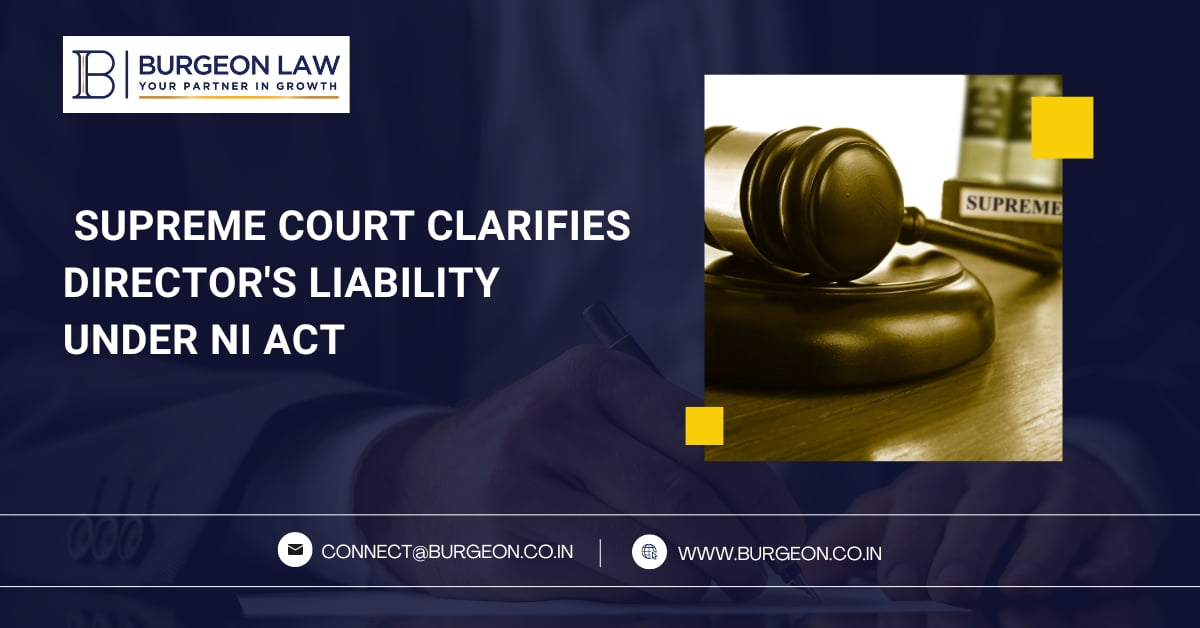In a recent judgment delivered on March 15, 2024, in the matter of Susela Padmavathy Amma. vs. M/S Bharti Airtel Ltd.,(2024 INSC 206), the Hon’ble Supreme Court (the “Court”), while quashing a criminal complaint filed against one of the directors of a company in connection with the offence punishable under Section 138 read with Section 142 of the Negotiable Instruments Act, 1881 (“NI Act”), held that vicarious liability of a director for an offence committed by a company under the NI Act arises if at the material time the director was for the conduct of its business of the said company.
Key Facts:
- M/S Bharti Airtel Ltd (the “Respondent”) had filed two complaints for offences punishable under Section 138 read with Section 142 of the N.I. Act, in relation to dishonour of cheques, against three accused persons namely, M/s Fibtel Telecom Solutions (“Fibtel”); Manju Sukumaran Lalitha (“MSL”), and Susela Padmavathy Amma, (“Appellant”).
- Fibtel, which operates in the telecom sector, had entered into a service agreement with the Respondent. While MSL was the director and authorized signatory of Fibtel, the Appellant was merely the director of Fibtel.
- The case of the Respondent was that Fibtel owed it a sum of Rs. 2,55,08,309/- in exchange for services provided by the Respondent. To settle the dues, Fibtel had furnished five postdated cheques to the Respondent. However, upon submission, the cheques were returned unpaid with the reason “payment stopped by drawer”. Aggrieved thereby, the Respondent filed criminal complaint under the N.I. Act.
- The Appellant, being a director of Fibtel, had approached the High Court of Madras to quash the criminal complaints against her. However, the court dismissed her plea, following which she filed an appeal before the Court.
- The Appellant contented that she was not involved in the day-to-day affairs of Fibtel, and she was also not a signatory to the cheques in question, therefore cannot be held vicariously liable for the default of Fibtel.
Key Issue:
- Whether a director of a company be held vicariously liable for an offence committed by the company under Sections 138 and 142 of the NI Act, simply by virtue of being a director?
Key Findings (Judgment):
- Referring to the relevant excerpts from its previous judgements in the matter of State of Haryana vs. Brij Lal Mittal and others ((1998) 5 SCC 343), the Court observed that a person cannot be made liable unless, at the material time, he was in-charge of and was also responsible to the company for the conduct of its business.
- Furthermore, concerning the aforementioned issue relating to the vicarious liability of the director, the Court relied on its previous judgment in the matter of S.M.S. Pharmaceuticals Ltd. vs. Neeta Bhalla and another ((2005) 8 SCC 89). The Court ruled that, merely because a person is a director of a company, it is not necessary that he is aware of the day-to-day functioning of the company. There is no universal rule that a director of a company is in charge of its everyday affairs. It was, therefore, necessary, to aver as to how the director of the company was in charge of day-to-day affairs of the company or responsible to the affairs of the company.
- However, the Court distinguished the above necessity in cases where the individual holds the position of a managing director or a joint managing director, as their responsibilities may differ. As their titles suggest, these individuals are in charge of the company and are responsible for its business conduct. To avoid liability, they must demonstrate either their lack of knowledge of the offense at the time it was committed or their exercise of due diligence to prevent its occurrence.
- In light of the above, the Court concluded that, to fasten vicarious liability under Section 141 of the NI Act on a person, the law is well settled that the complainant should specifically show as to how and in what manner the accused was responsible. Simply because a person is a director of a defaulter company, does not make him liable under the NI Act. Only the person who was at the helm of affairs of the company and in charge of and responsible for the conduct of the business at the time of commission of an offence will be liable for criminal action.

